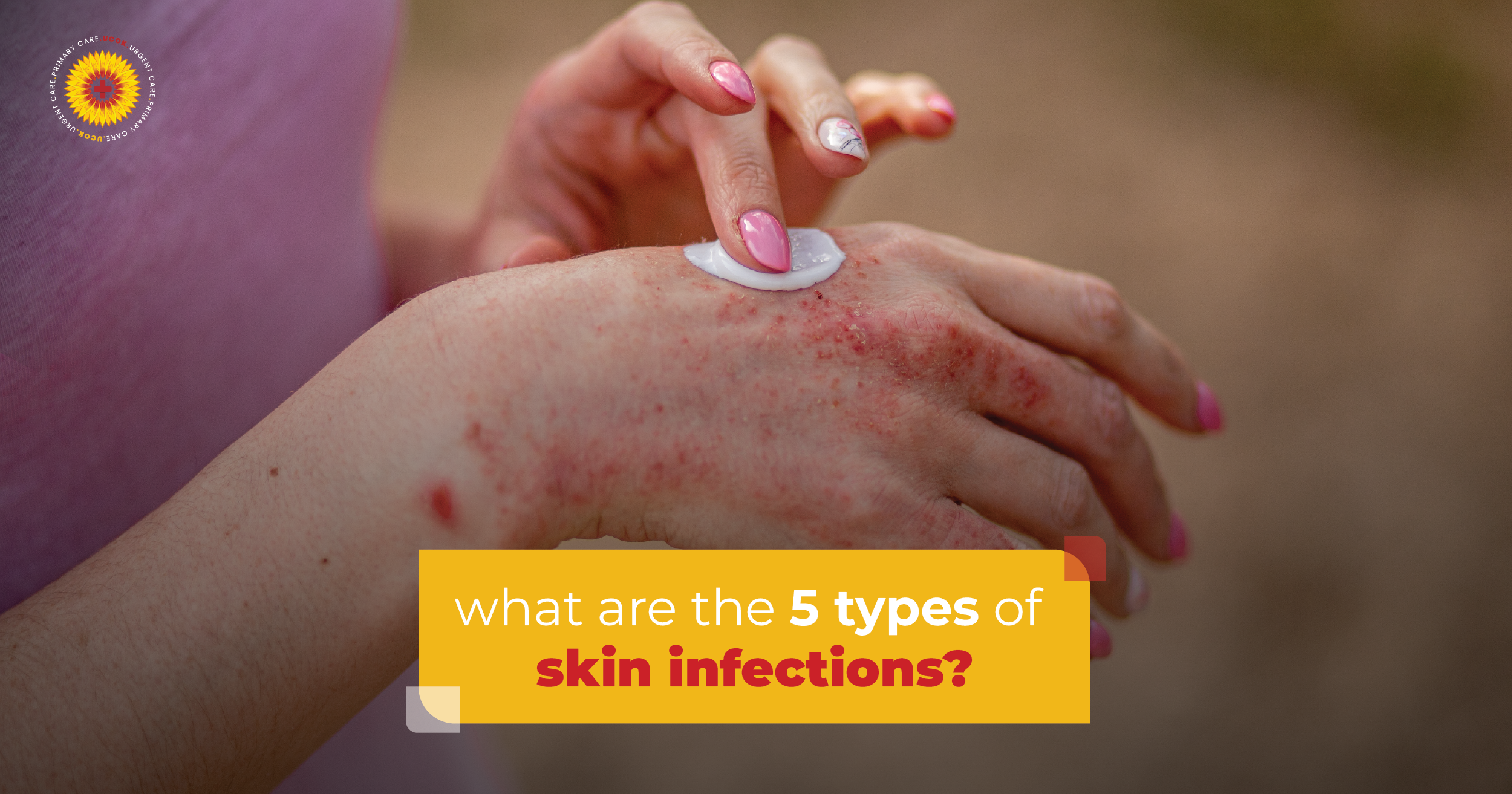Skin infections can cause pain to individuals of all generations. Our skin, our biggest body part, often faces harmful stuff like bacteria, viruses, and germs. This makes it a target for different infections.
These can be due to bacteria, germs, or viruses and can go from small troubles to serious health concerns needing a doctor. A local infection occurs in specific areas of the skin but, if untreated, can sometimes spread.
But, what are the 5 types of skin infections we need to know the cause of? Let’s dive into the basic types of skin infections. We’ll cover their causes, symptoms, and treatments.
Urgent Care of Kansas is dedicated to your comfort and convenience. We quickly treat non-emergency illnesses and injuries for everyone. Our services cover skin rashes and common ailments, meeting urgent medical needs. Contact us for more information.
Why Skin Health Matters?
Your skin is a defensive layer, fending off unwanted germs. Even small cuts or random cuts on the body can let infections sneak in. As a result, it’s quite imperative to protect your skin.
Common Causes of Skin Infections
Several elements contribute to skin infections. These include:
- Poor hygiene
- A weakened immune system
- Exposure to infectious agents
Realizing these motivations, you can keep your skin safe.
What Are the 5 Types of Skin Infections?
Skin infections can be identified by their basis. Here are the five essential kinds of skin infections:
-
Bacterial Skin Infections
These skin infections happen often. Dangerous germs enter via random cuts on body or skin openings. The common microbes are Staphylococcus aureus and Streptococcus species.
Common Bacterial Skin Infections
- Cellulitis꞉ Redness, swelling, warmth, and pain mark a severe lower leg infection. Rapid care is essential to avoid significant hazards. So, getting medical help promptly is vital to avoid dangerous complications.
- Impetigo꞉ This infection spreads easily and mostly affects children. It creates blisters and honey-colored crusts around the mouth and nose. It can spread to other areas.
- Folliculitis꞉ Hair follicles get infected with this problem. It produces scarlet, enlarged spots or pimples. Bacteria usually cause it, but fungi can too.
-
Fungal Skin Infections
Skin, hair, and nails are victims of fungal infections. Places like feet, groin, and scalp warm and wet are their favorites. Touch or dirty surfaces spread these infections.
Common Fungal Skin Infections
- Ringworm (Tinea corporis): This isn’t a worm, yet it’s catching a lot. This creates circular, red spots on your skin, borders often stick out.
- Athlete’s Foot (Tinea pedis): It’s fond of feet, notably between your toes. Expect itching, a burning sensation, and peeling.
- Jock Itch (Tinea cruris): The groin is its home, leading to a red, ticklish rash. This rash may pass onto your inner thighs, buttocks, and privates.
-
Viral Skin Infections
Viruses often lead to various skin problems. Each virus creates different symptoms.
Common Viral Skin Infections
Herpes Simplex Virus: Painful blisters erupt when the virus emerges from hiding.
Varicella Zoster: This virus triggers an itchy rash. It can potentially resurface as shingles years later.
Human Papillomavirus: This virus spawns warts on:
- Hands
- Feet
- Genitals
Some strains are linked to skin cancer.
These viruses lurk silently and can strike unexpectedly, causing discomfort and concern.
-
Parasitic Infections Skin
Parasites can cause skin infections. These often spread through contaminated surfaces or infected people. These infections are more common in tropical and subtropical areas.
Examples:
- Scabies: Mites cause severe itching and burning. It’s highly infectious and spreads through direct contact.
- Lice: Licea primarily target the scalp, but they can also invade other areas. They cause itching and are transmitted through direct contact or shared objects.
- Chiggers: These microscopic mites produce red, painful bites by biting. They are typically located in fields of grass or forested areas.
-
Allergic Skin Reactions
When allergens hit, the body reacts strongly. Skin acts as if infected, even without germs. It turns red, itches, and swells. Common triggers include pollen, pet dander, medications, and food, which can cause misleading reactions.
Common Allergic Skin Reactions
Eczema: Eczema plagues sufferers with itchy, sensitive skin. It often flares up in the following areas:
- Faces
- Hands
- Joint creases
Hives: Hives emerge suddenly as swollen red patches. They are often sparked by:
- Food allergies
- Drug allergies
- Environmental allergies
Contact Dermatitis: Contact dermatitis reacts when the skin faces irritants. Common irritants include:
- Poison ivy
- Metals
- Harsh skincare ingredients
Treating Skin Infections
Skin infections need a mix of treatments. Key strategies include:
- Cleanliness
- Medication
- Lifestyle changes
Treatment Options
For mild cases, creams are enough. For severe cases, pills are necessary. Keeping the area dry is vital.
- Abscesses may need draining.
- Hormonal applications can help relieve scratchy, tender skin.
Doctors choose medication based on the infection type. Bacteria need antibiotics. Fungi need antifungals. Viruses need antivirals.
Value of Complying with Medical Guidance
Following medical advice and completing treatments is crucial for recovery and avoiding complications. Proper care is essential to stop the spread and help healing.
Final Thought on What Are the 5 Types of Skin Infections?
Skin infections differ and require unique approaches. Bacteria, fungi, viruses, parasitic infections skin, and reactions can produce them.
Quickly spotting symptoms is vital to avoid complications. A suitable identification brings about the appropriate care.
Early medical advice ensures the best results. Knowing “what are the 5 types of skin infections” facilitates prevention. Treatments are tailored to specific conditions. Acting quickly reduces health risks.
Awareness is key to maintaining skin health. Professional advice is crucial for managing infections.
FAQs
Q: Can pets spread skin infections to humans?
Yes, conditions like ringworm can transfer between humans and animals.
Q: Is salt water good for skin infections?
Saltwater can help minor skin infections. It draws out dirt and reduces swelling. However, be careful with open wounds, as they might get irritated. So, it’s best to consult a doctor before trying this home remedy.



No comment